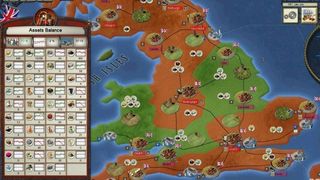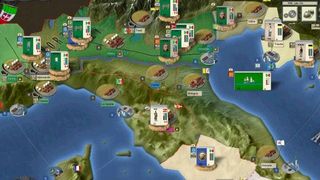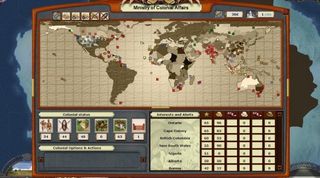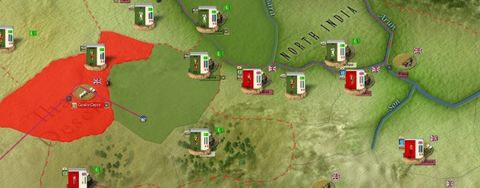Our Verdict
If youve got the patience to penetrate this game, and to put up with its dawdling, youre in for a treat.
PC Gamer's got your back
European settlers are taking your land, and armed resistance has proved ineffective. What do you do? If you're the Xhosa people of southern Africa, you put your trust in a millennial prophesy, slaughter all your cattle, and wait for divine assistance. If you're a native faction in AGEOD's breathtaking colonial behemoth Pride of Nations, you pray the player will get tired of the lengthy turn processing times and quit the game.
PoN is a thoroughly absorbing depiction of Victorian (1850-1920) geopolitics, but at the moment I seem to be spending as much time watching a whirring cogs cursor, as turning the world into a tea drinking, cricket playing, sexually repressed satellite of the UK. Every 15-day turn ends with a few minutes of enforced idleness as the CPU does its sums. Given the depth and scope of the simulation, perhaps these interruptions shouldn't come as a great surprise.

Where AGEOD's early games – likeable curios like Birth of America (71%) and American Civil War – were geographically limited and mainly martial in their focus, this time there's an entire globe to enslave and a swarm of economic, diplomatic and colonial factors to consider. If your notions of historical strategy have been shaped by the Total Wars, the jungle of data and distractions is going to seem impenetrable.
Yet PoN isn't machete-proof. Though the tutorials are brief and the post-turn reports lumpen (where's my newspaper-style digest of the last fortnight's events?), I'd actually place this above the last two Paradox mega-productions in terms of friendliness. Choose a nation like GB, and you can, to a certain extent, learn on the job. The obscene wealth rolling in from pre-established colonies and trade deals is more than sufficient to cover early military experiments and colonial fumbling.

It's in the way those foreign forays are handled that PoN outclasses its closest rival, Victoria 2. That game just doesn't have the same combat texture or authority. It doesn't work nearly as hard to model the colourful subtleties of the colonial process. Here you don't draw far-off territories to your national bosom by assigning Focus Points to them. You organise expeditions, send Biblebashers, dispatch gunboats, and initiate a plethora of other actions. It's a slow and pitfall-strewn process (rushing can provoke revolts), but an atmospheric one. As you contemplate your next play, you can almost hear the murmuring of native bearers and feel the sun beating down on your dusty pith helmet.
There's inventiveness and colour in the diplomatic arena too. Territorial friction that would lead to conflict in other games can trigger tense summits and cruel bloodless humiliations in PoN. Disputed territories may be staked in pokerstyle minigames. Misread the crisis and you may end up haemorrhaging precious prestige or inadvertently sparking a world war. It's the most imaginative and captivating take on power politics since Solium Infernum.

Games like this can be wrecked by too much historical determinism or too little. AGEOD seem to have got the mix about right. By default, major powers will meddle in the general areas where they historically meddled. You won't find Japan squabbling over Sudan, or Italy making a bid for New Zealand. Apart from the odd bizarre trade and battle result, and inconsistent treaty, everything rings true.
If it wasn't for those tiresome timeouts, I'd be insisting you try this. It's the thought of 84 hours of thumb-twiddling, during a 1680- turn grand campaign, that causes me to hesitate.
If youve got the patience to penetrate this game, and to put up with its dawdling, youre in for a treat.

